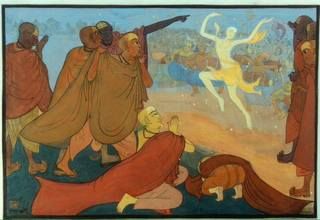
Plans for Incorporation
Websites from the ISKCON Universe

Sunday Love Feast for All | ||||||||||||||||||
| ||||||||||||||||||
| ||||||||||||||||||
 “Sometimes we would discuss something together and at times he was clearly right but other times I would feel that I saw something that he didn’t see and he would realize that I had. But, I did have faith in him because it happened again and again that in the morning he would chant and reflect on whatever the issue was. If it really was a point where he should have come around, he did come around. So, even though he was such a powerful and forceful person he was controlled—even invisibly—by Krishna and Srila Prabhupada.
“Sometimes we would discuss something together and at times he was clearly right but other times I would feel that I saw something that he didn’t see and he would realize that I had. But, I did have faith in him because it happened again and again that in the morning he would chant and reflect on whatever the issue was. If it really was a point where he should have come around, he did come around. So, even though he was such a powerful and forceful person he was controlled—even invisibly—by Krishna and Srila Prabhupada.
—Giriraj Swami




____________________________
Devotees Appreciations
Giriraj Swami’s Appreciation

THE SEARCH FOR POWER AND DISCOVERING ITS REAL SOURCE: In addition to the ultimate life lesson that we are incompatible with matter and need to be in a spiritual environment to realize our true fulfillment and source of power, we also have to deal with our relative life issues. They need to be sorted out so we won’t be distracted and drained by them. From my perspective and experience, this work is favorable for bhakti, and is part of being a balanced human being with the ability to give our whole heart to bhakti. I realize that many of my recent blogs have a similar theme, the reason being that these topics are so important to understand. I see the great need for this inner work to be accomplished for all, and I am also engaged in it. I consider helping those involved in bhakti or interested in spiritual life part of my life's mission. I pray that you seriously think about what I write about here. So please bear with the repetition as I bring up new points each time.
Otherwise, our failure to uncover and work through our life lessons and unhealthy conditioning keeps us spiritually stuck. We see too many examples of this, I think because there has not been enough emphasis on exactly how to do this work, which is really “anartha-nivritti,” since unhealthy, reactionary, unexamined habits, cause us to not hear our inner guidance or deal properly with others with the tendency for aparadha and offensive chanting.
Many of our karmic issues are highlighted by our family of origin. It’s worthwhile to reflect on this, especially when we become aware of dysfunctional and troubling patterns in our life that bring us distress in relationships, complicate making our particular contribution, and feeling satisfied with the direction of our lives. The excuse that sometimes comes up in therapy that “this is just the way I am,” is a very poor justification for bad judgment and unkind or aggressive behavior.
While we all have particular personality types, certain learned survival behavior is not helpful for our progressive life, being kind, loving, and compassion persons, and realizing our full potential. Sometimes a major crisis or illness is required to help us examine our lives and how we are required to change.
We will ideally feel that the stakes in remaining the same are too high, and we must rise up or remain miserable. This is currently happening to me, and also happened many years ago, when at thirty I was compelled to understand my conditioned nature and my life work—I had no idea what a long road this would be!

The first Kulimela, held in New Vrindaban, West Virginia in 2006, was an effort by ISKCON’s second generation to move away from party-style gurukuli reunions and explore their identity and what they could accomplish both materially and spiritually. The 10th anniversary of that Mela, which also took place in New Vrindaban from June 15th to 19th this year, took those themes further and showed new levels of maturity and stability amongst the Kuli community, while still being full of joy and celebration.
 By Vrndavanlila Devi Dasi
By Vrndavanlila Devi Dasi Despite this fast changing world where promiscuity encouraged by the hedonist approach to life is overtaking almost everywhere, India still preserves its age old veneration towards celibacy. The vast majority of girls and boys still remain celebate till their marriage and even post-marriage lead a regulated life. Of course in cities, this ‘conservative’ species are on the brink of extinction, and even when preserved, generally make the person a butt of ridicule and curiosity. However, fortunately in villages it is still a norm. What is it which still allows the virtue of celibacy still thrive in India? It would be interesting to know this as this would help us build a similar structure elsewhere. A country’s spiritual culture can be felt in its social structure. A broad system is supported by number of social systems that in turn help realizing the primary objective. The primary Indian philosophy rests on the principles of karma, punar janma (rebirth) and departure for param dhama when one is successfully able to break the cycle of birth-death-rebirth. Continue reading "The Structural Gambit for Celibacy and Chastity
→ Dandavats"

New Releases from the Bhaktivedanta Archives.
June 24th, 2016
Vakreśvara Paṇḍita Appearance Day
The Bhaktivedanta Archives is pleased to offer two new releases: The VedaBase™ 2016 update and the original unedited audio of Śrīla Prabhupāda for the year 1971.
The 2016 VedaBase™ update includes:
1) Updated audio transcripts for the year 1971
2) Śrī Vyāsa-pūjā 2011–2015 (5 books)
3) Life’s Final Exam by Giriraj Swami
To read the entire article click here: http://goo.gl/Wu81hx
 By Kesava Krsna Dasa
By Kesava Krsna Dasa With many cases of religious extremism tormenting or instilling fear into people we can hardly blame certain bright thinkers for their agnosticism: “Religion is a fashionable substitute for belief.” (Oscar Wilde) With all these quotes we can better understand the frustration of thinking people. If given a credible, intelligible presentation of genuine spirituality they may happily apply themselves. They want the truth just as much as spiritual seekers want it: “There’s something in every atheist itching to believe, and something in every believer itching to doubt.” (Mignan McClauglin) These itchy sentiments can manifest as almost religious feelings: “The most valuable things in life are not measured in monetary terms. The really important things are not houses or lands, stocks and bonds, automobiles and real estate, but friendship, trust, confidence, empathy, mercy, love and faith.” (Bertrand Russell) While attempting to relieve their itch for truth the usual temptations for being a controller can impede the flow. Just as the atheist was made a ‘God’ by a Hindu, Mr Russell had a bigger chance at Godhood: “I was told that the Chinese said they would bury me by the Western Lake and build a memorial to my memory. I have some slight regret that this did not happen, as I might have become a God, which would have been very chic for an atheist.” Continue reading "Itching Atheists
→ Dandavats"

Harinama in France (Album with photos)
Harinam Sankirtan in Tours during the France Music Day….and visit to New Mayapur….this year is the 40th anniversary of Sri Sri Krishna Balarama deities installed personally by ISKCON’s Founder Acarya Srila Prabhupada.
Find them here: https://goo.gl/Q5OoZ5
The post Bhima Ekadashi debate with Pandava Sena video appeared first on SivaramaSwami.com.

Dallas police are looking for two men who broke into a Hare Krishna temple the night of June 13 and stole thousands of dollars in property. The burglars picked a lock or rattled a gate in the parking lot of the International Society for Krishna Consciousness temple in Old East Dallas, property manager Mike Meyer said. The temple also houses Kalachandji's, a vegetarian restaurant that was founded a few years after the temple in the 1970s.

What is the root of devotional service to Lord Krishna?
“The root cause of devotional service to Lord Krsna is association with advanced devotees (sadhu sanga). Even when one’s dormant love for Krsna awakens, association with devotees (sadhu sanga) is still most essential.” CC Madhya 22.83
You may be familiar with Rupa Goswami‘s explanation of the development of pure devotional service. It starts with a little attraction or faith (sraddha) which brings us to the temple or sanga gatherings. Then we need to engage in sadhu sanga, association with advanced devotees. By such association we should develop strong faith, and commitment to the process of bhakti yoga. Through continual sadhu sanga, we should gradually make advancement in spiritual consciousness, rise above the miseries of material existence, and become increasingly peaceful and happy.
For many people, everything develops as it should. But some of us can remain unhappy, even depressed, and feel as if we are stuck in a spiritual rut? For some of us, association with other devotees may be sullied with petty differences and some of us may feel very discouraged and alienated by such experiences. Why do these difficulties occur?
Srila Prabhupada tells us it is because we are not properly trained in the culture of sadhu sanga. He says, “unless and until one is trained in the culture of good association, one cannot become good.” (SB 3.3.6 purport)
On this web page: https://improvingsanga.wordpress.com/ we examine some of the many instructions that Srila Prabhupada gives on the subject of sadhu sanga.
We encourage everyone to begin regularly discussing at least Bhagavad-Gita As It Is with their family or friends.
See more details in poster!
The post Free book launch 29th June appeared first on The Loft Yoga Lounge Auckland.

What happens when you chant Hare Krishna in the streets of Paris? (1 min video)
Srila Prabhupada: Sri Caitanya Mahaprabhu is de...

A long-awaited appearance on the devotional goods market has finally premiered in the form of Silver Tulasi Mala! Original and unique high-standard Tulasi-mala in a stylish and broad range of designs with first-class mala and silver, the creative offspring of Mayapur residents Gauranga Simha and his wife Mayapuresvari, who are totally styling it with exceptional standards, quality, and beauty. Design your own with Gauranga Simha and Mayapuresvari, or select from their extensive range of fabulous Tulasi-mala. Their range also includes some fine silver jewellery, and rare styles of kavacas and lockets. Contact Silver Tulasi Mala through Facebook, or visit their web site to see the catalogue and place your order! Delivery Worldwide!

This summer and fall, for ISKCON’s 50th anniversary, the GBC Ministry for Cow Protection and Agriculture will run conferences on simple living in four continents. It hopes that the conferences will also launch a support network for ISKCON farms around the world. The Ministry was first established in 1998 by Balabhadra Das of the International Society for Cow Protection (ISCOWP), who emphasized working with oxen and encouraged devotees to take up cow protection as a key part of their mission.
The post Daily Darshan : June 24th, 2016 appeared first on Mayapur.com.

Blissful Kirtan in Istanbul - ISKCON TURKIYE (1 min video)
Srila Prabhupada: By chanting the Hare Krishna mantra, we gradually ...

New Sydney Temple Project (Album with photos)
Ramai Swami: The third Sydney West temple fundraiser this year was well attended...
(Kadamba Kanana Swami, 26 April 2016, Radhadesh, Belgium, Vyasa Puja Address)
Many of you have discussed my health and it imposes some further limitations on me. What can I say!? I have to start thinking about going slow, what a boring thing but what to do!? Limited! The guru is limited so ultimately, at the end of the day, the ball is back in your court. It may go back and forth but then at the end, it is in your court. I will play, no problem, that ball will come back to you many times but at the end, it is in your court only and nowhere else and then it is up to you what you do with it…
 As they say in good American slang, “You win a few, you lose a few.” I really wish the best for everyone but the reality is, “You win a few, you lose a few.” Some people are going to take it, some are not going to take it and sometimes it is really sad to see how people throw away an opportunity. Please, PLEASE realize what amazing, precious opportunities are being delivered through the disciplic succession. Let us do it all the way, let us not become distracted by the petty little things of this world, like sex desire!
As they say in good American slang, “You win a few, you lose a few.” I really wish the best for everyone but the reality is, “You win a few, you lose a few.” Some people are going to take it, some are not going to take it and sometimes it is really sad to see how people throw away an opportunity. Please, PLEASE realize what amazing, precious opportunities are being delivered through the disciplic succession. Let us do it all the way, let us not become distracted by the petty little things of this world, like sex desire!
Everyone has it! I have said it before and I will repeat it today, we may have sex desire but we should not put so much faith in sexual activity. I mean, is it going to fulfil us? Let us be real. We are here in this Krsna Consciousness movement because we have some doubt about that. It is a fact that sexuality plays a part in life but it is not going to fulfil us.
Even after so much sexual activities still something is missing, still we are not beaming with happiness, still not effulgent, still not ecstatic… So let us not make too much of it. The world is oversexed basically; they make too much of it. There is a place for sexual activity but they make too much of it. Whatever place it has in your life do not give it too much energy. In my life, it is zero. Let us deal with more important things. This is the point!
People are looking for romance and then relationships break… new ones start… all these things are going on. Okay, if you need that then it is okay but within the boundaries, do not go over the line because then you are damaging your spiritual progress back to the spiritual world. So keep it within the boundaries of what Krsna has blessed, what the acharyas have authorized and then make the best of it.
 Well, being married to this one or being married to that one is not so different. In the end, it is not that different actually. Personalities are different, true, we can look around the room and everyone has a different personality. So in marriage, also the personalities are different but the script is the same. The same script, the same laws:
Well, being married to this one or being married to that one is not so different. In the end, it is not that different actually. Personalities are different, true, we can look around the room and everyone has a different personality. So in marriage, also the personalities are different but the script is the same. The same script, the same laws:
vāco vegaṁ manasaḥ krodha-vegaṁ
jihvā-vegam udaropastha-vegam (Śrī Upadeśāmṛta 1)
The pushings of the senses are the same, the same modes of material nature create the same script. A little variety is there, the personalities, the actors are different but the play is the same old script. This is what it is. So do not make too much of it. It is alright but again it is not enough to fulfil us; only Krsna will fulfil us. Let us bring that into our relationships, into our community, at home and wherever we meet. Let us just bring in the culture of the spiritual world because that will really help us to shift the weight to the other side, to the spiritual side to become jivan muktas, liberated souls even in this body already. This is the idea!
These are some of the thoughts that I am sharing with you this year. Time is short. I hope I can be with you for many more years to come but Krsna is in control and we will see what happens and I hope that all of you can be here also for a long time and that we can do something very nice together!
Transcribed by Tattvavati dd
 By Brajahari das
By Brajahari das In this article, I compare the origin of universe as described in the Srimad Bhagavatam (SB) and the Big Bang (BB) theory . 1. The initial state According to SB, the initial state of matter immediately previous to its manifestation is called pradhana (SB 3.26.10p). In the BB theory, this initial state is called the singularity. The table indicates a clear similarity between these two initial states. Both states, i.e. pradhana and singularity, refer to a condition where no matter/space is manifested. Since, not even space is manifested, it is just an infinitely small point. SB describes it as void. Although no manifestation of matter/space, yet the total matter is contained and densely packed therein. It is a state where all physical laws break and thus beyond our ability to perceive. Continue reading "Origin of the universe: Srimad Bhagavatam and the Big Bang Theory
→ Dandavats"

Hare Krishna Festivals UK: Glastonbury, Day 4 (Album with photos)
Hare Krishna,
Over 3,000 plates of delicious prasadam (sanctified spiritual food) were served during the first full day of this year’s Glastonbury Festival :) … Oh, and we went on a Harinam :)
Find them here: https://goo.gl/s6d97o

Madhvacarya das, ACBSP, left his body.
We are sorry to inform the devotee community that His Grace Madhvācārya prabhu, Śrīla Prabhupāda disciple, left this world past Sunday 19 of June. He and a group of other devotees were celebrating his mother’s 95 birthday anniversary when he just felt on the ground, he passed away en route to the hospital surrounded by devotees. There will be last rites services at the Mexico City ISKCON temple next Friday July 1st.
It is worthy to add that his mother, Śrīmatī Rocana devī dāsī, is Śrīla Prabhupāda’s elder disciple still on the planet at 95 years old. She has several sons and daughters initiated and grandsons and granddaughters.

June 24. ISKCON 50 – S.Prabhupada Daily Meditations.
Satsvarupa dasa Goswami: Exchanges.
He would listen also, and he heard a wide range of local testimonies. He heard the dissatisfaction of young Americans with the war and with American society. One boy told him he didn’t want to get married because he couldn’t find a chaste girl; it was better to go with prostitutes. Another confided that his mother had planned to abort him, but at the last moment his grandmother had convinced her not to. He heard from homosexuals. Someone told him that a set of New Yorkers considered it chic to eat the flesh of aborted babies. And in every case, he told them the truth.
He talked with Marxists and explained that although Marx says that everything is the property of the State, the fact is that everything is the property of God. Only “spiritual communism,” which puts God in the center, can actually be successful. He discounted LSD visions as hallucinations and explained how God can be seen factually and what God looks like.
Although these one-time visitors came and went away, a few new friends began to stay on, watching the Swami deal with different guests. They began to appreciate the Swami’s arguments, his concern for people, and his devotion to Krishna. He seemed actually to know how to help people, and he invariably offered them Krishna consciousness – as much as they could take – as the solution to their problems. A few began to take the Swami’s message to heart.
To read the entire article click here: http://www.dandavats.com/?p=20490&page=9
The third Sydney West temple fundraiser this year was well attended. Vedavyasapriya Maharaja and I were guest speakers and also gave gifts to donors.
The was a beautiful bhajan led by Sri Prahlada and some of our devotee ladies presented a Bharat Natyam dance to a song written by Srila Bhaktivinoda Thakur.
The temple management informed everyone that construction on the new project would begin next year.
 By Laxmimoni dasi
By Laxmimoni dasi If Srila Prabhupada visited you, Maybe just for a day or two, And came by unexpectedly, I wonder what you'd do. Oh, I know you'd give your nicest room, To such an honored guest, And all the food you'd offer, Would be the very best. And you would keep assuring him, You're glad to have him there, That serving him within your home, Is a joy beyond compare. Continue reading "An Unexpected Guest
→ Dandavats"
 By Chaitanya Charan das
By Chaitanya Charan das Death can seem cruel when it takes away a dear one. The Bhagavad-gita may seem to add to the bewilderment when it asserts (10.34) that the death which steals away everything is a manifestation of Krishna. Why would Krishna, who is the well wisher of everyone, want to steal anything from anyone? The Gita prepares us for this discomforting assertion by first broadening our philosophical perspective of life. Many people see life as having only one dimension: the material. Within this unidimensional materialist perspective of life, death seems to be the ultimate disaster: the total irrevocable termination of our identity and destiny. Gita wisdom expands our horizons by informing us that our existence is two-dimensional: material and spiritual. We are spiritual souls residing temporarily in material bodies. In fact, Gita wisdom goes further to inform us that our real life is only spiritual: a life of eternal love and joy in relationship with Krishna. We actually have nothing to do with the material sphere where we presently reside. When contrasted with our ecstatic eternal life in the spiritual realm, the material sphere is seen as a mere distraction – and a miserable distraction at that. Gita wisdom exhorts us to enthrone the ambition of returning back to Krishna in the spiritual realm as the supreme goal of our life. Continue reading "How are we to see Krishna’s hand amidst tragic, premature death of devotees?
→ Dandavats"

The mind: a friend or an enemy?
Mahatma das: Ignore the Mind!
Our acaryas advise us to learn to ignore our mind. Why? Well, we shouldn’t ignore it when we are thinking of Krsna. But in our conditioned state, the mind really has a mind of its own. When we decided to become devotees, the mind didn’t agree. And it still is resisting surrender. When the mind presents thoughts that are detrimental to our Krsna consciousness – or to our well being – we can jokingly tell our mind, “Thank you for sharing,” and decide to connect more deeply with our Krsna consciousness. Since the mind is often like a nagging roommate who continually distracts us from our highest good, knowing how to neglect it is a necessary Krsna conscious survival skill.
To effectively neglect the mind, we need to become more detached from it, something we are not well accustomed to do. Of course, the mind can be the best friend, but the problem is that we often take the mind for a friend when it is acting like an enemy. “Go ahead, do that, look at that, buy that.” And we often think, “OK, that sounds good,” without thinking, “Wait a minute. That’s not what I should be doing. My mind is tricking me.” And even when we know we are being tricked, still, because the mind is so strong, we may find it difficult to resist. To be Krsna conscious means to be prepared to fight with this the mind “by constant practice and detachment.” Constant practice means to never give up no matter how difficult controlling the mind may be.
Changing our beliefs
In my forgiveness seminar I explain that reluctance to forgive is often connected to a belief about forgiveness. For example, people often believe they cannot forgive until their offender apologizes. But if they change this belief to, “I can take responsibility to forgive even if my offender doesn’t apologize,” they immediately find they can start to let go.
So another way of dealing with the mind is to examine the beliefs that are behind your thoughts and actions. Changing a belief will change the thought associated with the belief. If you tend to have negative thoughts, it’s likely you hold a lot of negative beliefs (“nothing ever works outs well for me, things will never get better, I’ll never be advanced, my mind is impossible to control, etc.”). Ask yourself what beliefs might be causing your negative thoughts.
Instructing the mind.
In the song Bhaja Hure Mana, Govinda das speaks to his mind by reasoning with it. In the same way, when we find our thinking detrimental to our progress, we can ask our mind questions as to why it is attached to things that are taking us away from Krsna. We can ask ourselves empowering questions, questions that will naturally redirect our thoughts towards Krishna consciousness. In this way, we can reason with our mind to give up self-destructive thoughts and accept real devotional qualities. And we can also tell our mind what we expect give it reasons to behave properly.
Dealing with emotions.
How do we deal with emotions, particularly emotions that appear to not be Krishna conscious?
There is a tendency to neglect emotions that are unpleasant, much in the same way that we try to neglect negative thoughts. But emotions don’t always go away when we neglect them. They often remain hidden while acting out in subtle ways. According to Vedic psychology, allowing yourself to experience negative emotions – the ones you might naturally try to bury – activates your intelligence to deal with them. In other words, your emotions speak to you and by listening to them you can learn how to improve. For example, during a time when I was not paying as much attention to my sadhana as I normally do, I was feeling guilty about not following Prabhupada’s instructions as strictly as I should. Since this was causing me to feel pretty miserable I didn’t want to confront the painful feeling that I was letting Prabhupada down, so I buried it and pretended it didn’t exist. A devotee suggested I totally face that feeling because that feeling was telling me something. When I faced the feeling I immediately felt that the misery from not following was far greater than any perceived misery I was trying to avoid by making the effort to strictly follow. So the “negative” emotion was instructing and helping me come to a higher platform, but I was only able to get the instruction when I stopped trying to bury the feeling.
Desiring Krsna consciousness.
We often bring problems into our lives through our minds. Sometimes we say, “I can never… (you can fill in the blanks”) and that is exactly what happens. The mind’s vibrations are real and thus have a real effect on our external existence (and even on our physical health). Of course, this also works in a positive way. Elevated devotees desire and expect more Krsna consciousness and more of guru and Krsna’s mercy, and thus they find more of this coming into their lives. This shows that Krsna reciprocates with a negative or positive mind set.
We may look at our lives and think “why has Krsna placed so many obstacles in my path?” when it may be that a negative mind set is attracting those problems.
Constant Effort.
Constant effortThe mind tends to be habituated to a certain way of thinking. This means that of the tens of thousands of thoughts we have daily, the majority are the same. Our goal is to habituate our minds to Krishna conscious ways of thinking. This is quite possible, but we need to make a conscious effort to do so. Then our minds will naturally pull us toward Krishna rather than away from Him.
Krsna never said this is going to be easy, but He did say it is possible. How? It is possible by endeavoring by right means and by detachment. That means if we put our guard down, we’ll be in trouble. The more we practice, and the more we become detached from doing whatever the mind says, the more we take control of the situation and create new positive habits. Since you are above your mind, ultimately you are in control. You just have to exert that control.
Can we do it? Since Krishna has given you free will, you can choose to seek out those thoughts that inspire and uplift you, that connect you with your greatest spiritual ambitions. Do I hear you say, “Yeah, but that’s not always easy?” (Here we go again with those negative thoughts.) Always remember that difficult things become easy for one who has the mercy of guru and Krishna.
The lecture is available here: https://goo.gl/gp9KRv

Ask a Monk any question - London - Who Will Win the Football Euro Cup? (4 min video)
The Football Euro Cup 2016 is upon us, and...
(Kadamba Kanana Swami, 26 April 2016, Radhadesh, Belgium, Vyasa Puja Address)
Every spiritual master is representing the sampradaya and is representing the knowledge of scriptures in parampara and at the same time, every spiritual master is an individual and each individual is different and therefore every spiritual master brings in his own individual mood.
 Well, I am from that small country, the Netherlands. A country that has a lot of history and was involved in a lot of wars because it is always the small guys that get picked on naturally. For example, in the time when Protestants came into being in Europe, starting in Germany, Switzerland followed and Holland was also among the countries that became Protestant.
Well, I am from that small country, the Netherlands. A country that has a lot of history and was involved in a lot of wars because it is always the small guys that get picked on naturally. For example, in the time when Protestants came into being in Europe, starting in Germany, Switzerland followed and Holland was also among the countries that became Protestant.
At that time, Spain was a very great empire, very powerful and Spain was leading the inquisition. They were like the Catholic response at that time. So what happened was that they tried to attack England and they sent a fleet which was known as Armada, an invincible fleet, and what the British did was, in a sneaky way, they sent out old ships without any crew, they set fire to the old ships and they sent them to the middle of the Spanish fleet and the whole Spanish fleet burned down! So that was the end with the fight with England.
Then the Spanish looked around and the other Protestants were the Germans. They decided to leave the Germans alone so guess what… The next target was Holland. And sure enough, they came, those guys from Spain, they came and for 80 years there was a war between Holland and Spain. It was a huge thing. Some people were born in that war and they died in that war. The Dutch were fighting from the water with ships and the Spanish on the ground. The Dutch King who liberated the Netherlands was William of Orange. That is why orange is the colour of the Dutch because it stands for freedom which was conquered after 80 years of war. That made such a deep impression on the culture of the Netherlands; the hard-earned freedom!
Freedom is the motto and the culture of freedom has been deeply ingrained in the psyche of the Dutch and they are very independent, rugged individuals. In the Bhaktivedanta Manor, in the brahmachari ashram they all have similar uniforms: the same sweaters, the same hats and the same socks! In England this is possible because that is part of the culture. In Holland, it is not possible, no way. I appreciated though that Gurudas took the hat of the official uniform, cut it in half and then put it back on although Sutapa did not appreciate that… A little bit of rebellious spirit touches the heart of a Dutchman.
 I am also a bit of a rebel and I guess that many of you are also rebels. There is a good chance because rebels attract rebels. It goes like that. So I have a group of devotees who are all rebels and individuals, a bit independent and who like their own personal space. Well, that is all good. I am providing that personal space for you in Lord Caitanya´s movement and I don´t mind if Gurudas cuts his hat in half as long as he does not cut his rounds in half or other essential spiritual things in half. In that regards, I will have no tolerance at all. Yes, I will chastise and so on when need be but in principle, I guess since I am a rebel who wants some space to sort of be an individual, I provide space in this movement for being individualistic people.
I am also a bit of a rebel and I guess that many of you are also rebels. There is a good chance because rebels attract rebels. It goes like that. So I have a group of devotees who are all rebels and individuals, a bit independent and who like their own personal space. Well, that is all good. I am providing that personal space for you in Lord Caitanya´s movement and I don´t mind if Gurudas cuts his hat in half as long as he does not cut his rounds in half or other essential spiritual things in half. In that regards, I will have no tolerance at all. Yes, I will chastise and so on when need be but in principle, I guess since I am a rebel who wants some space to sort of be an individual, I provide space in this movement for being individualistic people.
So let us be that. Let us be strong individuals but with that let us also take responsibility. One who is individualistic can rely less on the community. When we see a herd of sheep, they may be a slight variety among them – different curls and one is grey, another one is white, but there is not too much difference. Do as the others do may not always work for us. At least it is not my mission in life to be counted among the sheep. But if we are not sheep, if we are more individualistic, then it also means that we have to individually take responsibility. We have to do it ourselves. Just like no one had to ever call me to get up in the morning. I could do it myself. I did it myself; I got up and went to mangala arati.
So take responsibility. This is the position of one who wants some freedom. One who wants some freedom can have it, if they take responsibility themselves. This is what we want in this movement; we want individuals to take responsibility themselves – each one flies his own plane, as Srila Prabhupada explains. Ultimately we are personally responsible. Yes, we may have a nice guru-disciple relationship. We have sweet exchanges and there may be inspiration and sometimes it may be boring also, but whatever may be, at the end of the day we cannot depend on others until the very end. We can be carried our whole life but at the very end, it is us who have to alone face Krsna and it is OUR Krsna consciousness that will count. Therefore guru-disciple relationships go so far. The guru is certainly doing what he can but how much can he do!? He is also human. He is also limited and even if he wants to do so many things he is limited.
Transcribed by Tattvavati dd